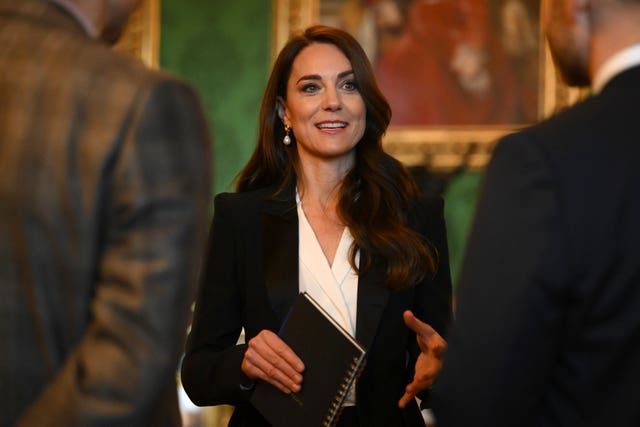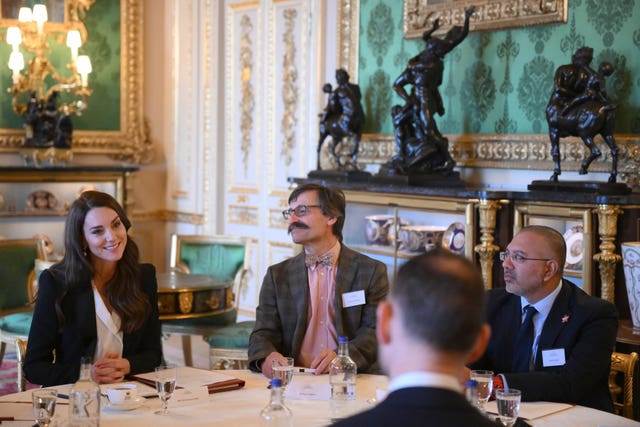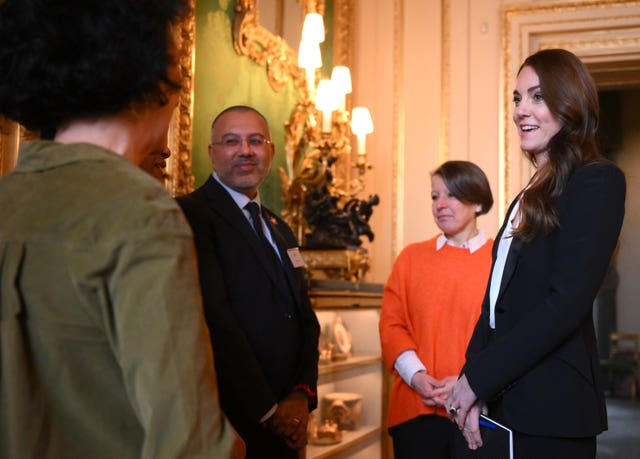The Princess of Wales said she is “excited” about a new early years campaign she is launching as she met her team of advisers on the subject for the first time.
Kate held talks with the eight academics, who represent sectors including neuroscience, psychology, perinatal psychiatry, early years services and policy development, at Windsor Castle.
It is hoped they will help find ways to give generations of children the best start in life.
The princess told them a key area that might be looked into is how to “develop the social and emotional skills which are vital for later life”.
It came as Kensington Palace said that Kate’s work through her Royal Foundation Centre for Early Childhood to promote the importance of the first five years of a child’s life is being accelerated.
Full details about the new campaign were not given but Kate told the group: “I am really excited for next week, there is lots coming out.”
She added: “Today I just want to think about and discuss what next, really. How do we keep this conversation going?
“This campaign’s really to try and raise the awareness of the importance of this issue. And it’s sort of what can we do collectively to keep the conversation going and what we do next.
“This campaign is really laying the foundation of why early childhood matters.”

Kate said it is about what helps shapes us, what shapes our relationships, and the emotional experience of childhood and about creating the “building blocks and the scaffolding” for how we first start to understand ourselves and others.
“These are really complicated, big issues to look at,” she said. “But I think, from the centre’s point of view, one of the main key areas is how do we develop the social and emotional skills which are vital for later life. How do we better manage and regulate our emotions? How do we build better relationships?”
She said they are dealing with “big questions, big topics” which are “complicated”.
The centre stems from research which shows that the first five years of childhood fundamentally shape adulthood, with social challenges such as addiction, violence, family breakdown, homelessness and mental health having their roots in the earliest years of life.

Advisory panel member Dr Trudi Seneviratne, a registrar at the Royal College of Psychiatrists, believes that “our experience in the earliest years lays the foundations for the rest of our lives”.
She noted that policymaking can be “quite fragmented”, adding: “Having policy that brings together the importance of the early years and helping people to collaborate on their thinking is really quite crucial.
“That will help with service development. It will help with research. It will help with education. It will help with the workforce who look after young children and everyone, really.”
Dr Seneviratne went on: “We need all of government to buy into this as a really ambitious long-term programme that actually continues regardless of changes of government – that’s really, really important.
“We can’t have constant change so policy needs to be embedded in education, in healthcare, in maternity care, post-natal care, in all of health and social care that supports families and it needs to continue. It needs to grow and expand – that’s absolutely critical.
“I think we run into lots of problems with projects opening and closing – that’s just not good enough for the child or indeed that family.”
Consultant perinatal psychiatrist Dr Alain Gregoire, who is the president and founder of the Maternal Mental Health Alliance, said early years research has developed to the point where experts know there are things that can be done to change lives for the better.
He said: “It’s something that can touch the whole of society and every single one of us.
“A critically important message with the early years is that it’s never too early – so, we’re talking about from the beginning of pregnancy, from conception onwards.
“We can change the life courses, the health, the happiness of individuals.
“But it’s also never too late, so, by understanding the early years, we can actually understand ourselves, the people around us, and our communities better.
“And we can do things that can help to improve the quality of life for ourselves just through that understanding.”

Professor Peter Fonagy, the head of University College London’s psychology and language sciences division, agreed to be on the advisory panel because he believes the centre “is going to be the most influential and effective organisation to represent the interests of parents and infants for some time to come”.
Being part of it could “in a small way benefit the welfare of generations, and generations of this country and beyond”, he added.
Eamon McCrory, professor of developmental neuroscience and psychopathology at University College London, is interested to see how research, particularly in neuroscience, might prompt societal change and improve a child’s future physical, social and mental health.
He thinks the centre has “extraordinary potential to transform our understanding and approach to the first five years of life”.
Carey Oppenheim, of the Nuffield Foundation, said “getting the fundamentals right in early childhood is part of creating a more resilient, productive and just society for us all” and “the formative early years of a child’s life provide the crucial building blocks for their long-term development and wellbeing”.
Beverley Barnett-Jones, an associate director at the Nuffield Family Justice Observatory, comes to the panel with more than 30 years’ experience in frontline children’s social care.
Ms Barnett-Jones, whose work has included being a children’s guardian with the Children and Family Court Advisory and Support Service, said: “Children who experience abuse and neglect often become involved with a social worker – these are some of the most vulnerable children in our society.
“Yet, with the right help at the right time, many of the problems that develop in later life could be ameliorated, even prevented, by earlier intervention in their lives.
“Working with and supporting the Royal Foundation will better aid a non-stigmatised understanding of these children’s life journeys, along with their families, as it provides a societal focus on what the village could look like that raises all of our children well.”
Ed Vainker, co-founder of Reach Academy Feltham, a high-achieving free school in a deprived area of west London which he started from scratch, and Imran Hussain, director of policy and campaigns for Action for Children, are also on the panel.




Comments: Our rules
We want our comments to be a lively and valuable part of our community - a place where readers can debate and engage with the most important local issues. The ability to comment on our stories is a privilege, not a right, however, and that privilege may be withdrawn if it is abused or misused.
Please report any comments that break our rules.
Read the rules hereLast Updated:
Report this comment Cancel